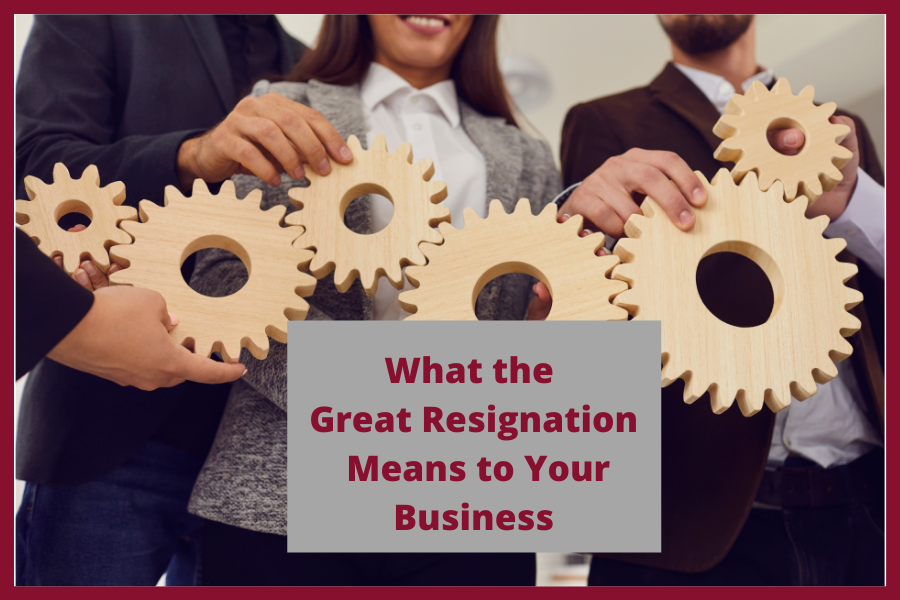- New Overtime Rule Increases the Salary Exemption Thresholds - September 27, 2024
- Maximizing After Tax Proceeds When Selling Your Business - June 7, 2024
- Understanding the Accredited Investor Rule 501 of Regulation D - February 27, 2024

Have a Question?
Ask your Question below!
One of our investors or advisors will answer.
According to the U.S. Bureau of Labor Statistics Job Openings and Labor Turnover Survey conducted in December 2021, more than 24 million employees left their jobs in the six months between April and September, 2021. For blindsided business owners, understanding why employees walked away from their jobs – particularly after the worst of the pandemic was behind them – is important.
For the most part, the pandemic served as a reset button for the owners of nearly every business left standing. Revenues changed drastically. Certain businesses benefited greatly by winning more business due to demands that didn’t exist prior to the pandemic. Others lost. And it happened virtually overnight.
Since then, if the business survived and regardless of the direction of its revenue swing, it did so by changing its business model. Costs were cut, certain expenses increased or were added, employees were added and lost. And while all of these changes affected existing employees, very few business owners understood the nature of what was happening.
And that’s because one of the most important assets your business has to offer a buyer is its people. It’s the people in your business who ensure its other valuable assets are developed, nurtured, and preserved in order to consistently have a profitable business.
In simple terms, the assets in the physical and intellectual property form will not produce a profit without the human capital which drives them.
What is Causing Employee Resignations?
Recently, the MIT Sloan Management Review published a MIT Sloan Management Review research study that identified the top five predictors of attrition and the four short-term actions to take to address this huge problem.
What’s been reported in the mainstream media is mostly about employees walking away from their jobs in search of greener pastures – specifically for more money. While this may be true, the MIT study pointed to very specific reasons that had less to do with compensation and more to do with how employees were feeling.
According to the study, when compared to compensation the following issues are more likely to result in an employee’s departure from the company and are the top predictors of attrition during the Great Resignation:
- A Toxic Corporate Culture – including failure to promote diversity, equity, and inclusion; workers feeling disrespected; and unethical behavior
- Job Insecurity and Reorganization Issues – layoffs and restructuring
- High Levels of Innovation – struggles with work-life balance due to unmanageable workloads
- Failure to Recognize Employee Performance – especially so for high performers
- Poor Response to the Covid-19 Pandemic
The Great Resignation Means a Reduction in Business Value
After reading this report, I recognized how similar these employee matters which cause millions of employees to exit their employment were to the topics we discuss with business investors and buyers as well as business owners when they are assessing the value of their business.
Why? Again, it’s competent and positive employees that drive the value of a business up. Because without them, all other business assets are less valuable. And so is the business.
When we speak with Private Equity investors and buyers who want to acquire valuable businesses, they ask about the business’ corporate culture and then they verify what they learn! I can’t count the number of deals that have fallen through because of a culture clash between the buyer and the business being sold. I’d be willing to bet it’s the number one reason for unsigned LOIs and failed deals.
Savvy buyers will spend much time during the acquisition process due diligence phase and the post-acquisition planning phase helping employees on both sides of the transaction to feel less insecure due to the inevitable changes that will take place. It’s very important in the long run to get this part of the deal right.
As for work-life balance issues for the employees of highly-innovative businesses, care must be given to improve workload expectations. Again, for the team of employees working on a sale transaction, there is a tremendous amount of work to be done. Not only do the employees on both sides of the deal have to do the work to get the closing behind them, they have to do their day jobs too!
Business buyers and Private Equity investors alike are quick to identify the high performers. They know if a long-term incentive program such as a deferred compensation or phantom stock plan isn’t part of a key employee’s compensation package, many will depart for greener pastures before the deal is done. The absence of such financial incentives for the high performers contributes to a less valuable business. Much less valuable.
Employees who feel the business owners and leaders have their back, especially when things do not go well, are ultimately happy and loyal employees. So it’s not surprising to assume that if an employee feels Covid-19 issues were not handled well, it’s likely they won’t believe the business owners and other leaders will successfully handle the inevitable disruptions created when the business is sold.
There are no shortcuts – you need your employees and they need to be treated well if you desire to build a valuable business.
The MIT Sloan Management study also identified several other interesting facts about the Great Resignation. Certain industries had a much higher attrition rate than others. They included Apparel Retail, Management Consulting, Internet, and Enterprise Software- an interesting mix of both blue and white collar industries.
How to Improve Employee Retention
For many business owners, they believe all they need to do is to provide their employees with competitive or additional compensation to keep attrition to a minimum. Apparently, they are wrong.
The study uncovered four things that are more important to employees than compensation and they include:
Providing employees with Lateral Career Opportunities – especially for those employees who do not want additional responsibilities, however desire to keep learning and contributing to the success of the business
- Allowing Employees to Work Remotely
- Holding Company-Sponsored Social Events
- Arranging for Predictable Work Schedules for All Employees
There is a lesson here for all business owners in the study’s findings. The similarities are remarkable between the reasons behind the Great Resignation and the employee retention issues valuable businesses regularly navigate. The pandemic simply magnified them.
For those business owners who managed to survive, and in some cases thrive despite the pandemic, it’s time to focus on your most important business asset – your employees. Now that you know what the important employee attrition issues are as well as what you can do about them in the short-term, you have a roadmap to help you build a more valuable business.















